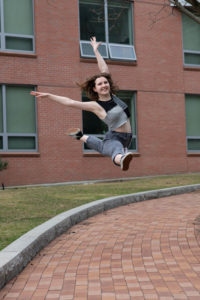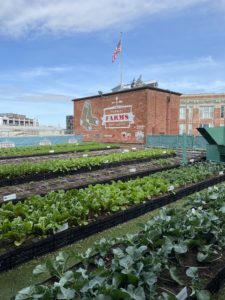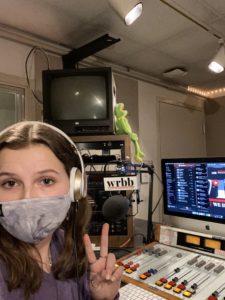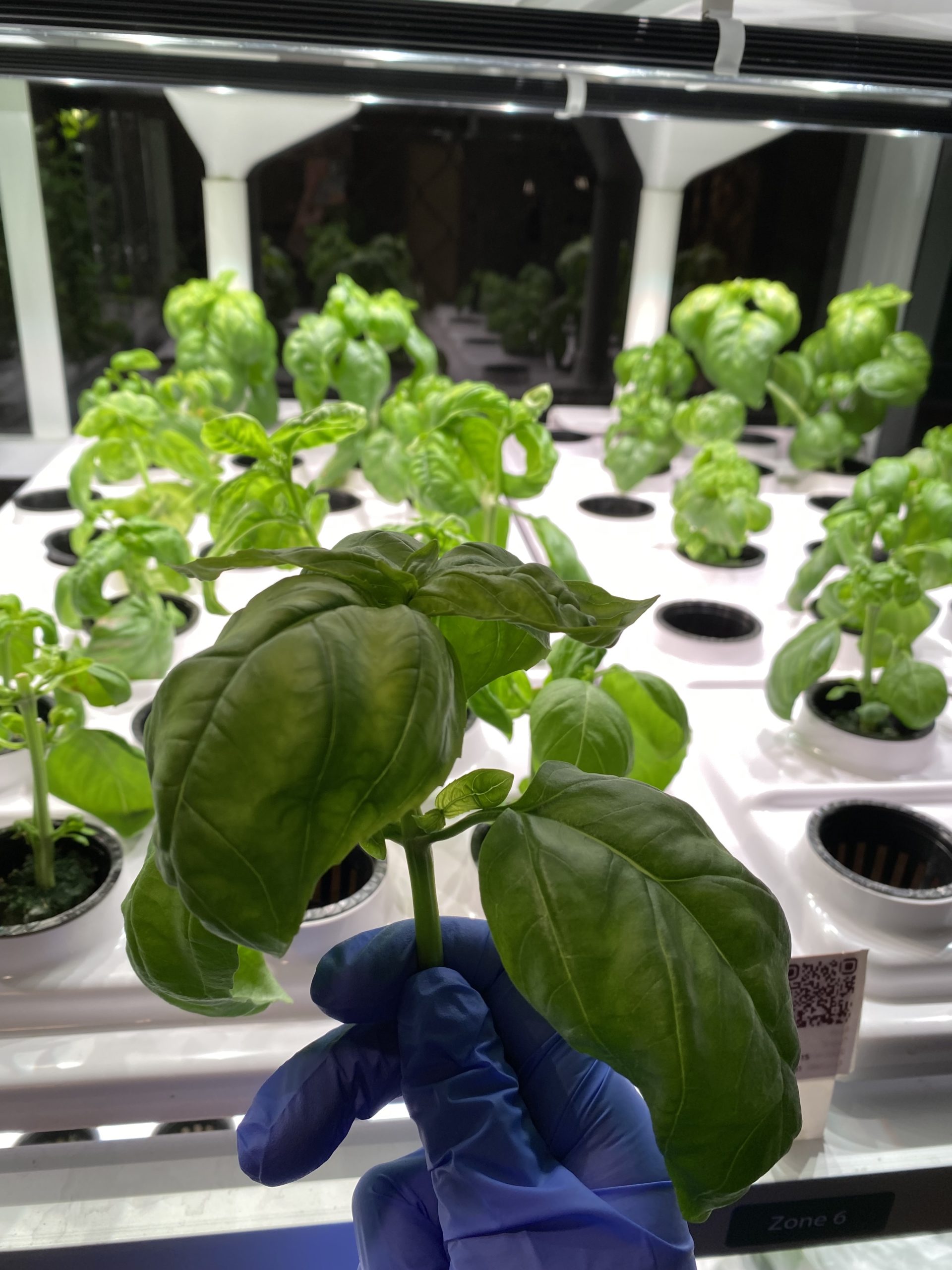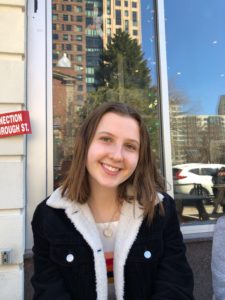 Katherine Antos, a marine and environmental sciences major, will take over our Instagram on Friday, June 3, to share her experience as a Horticulture Intern for Green City Growers (GCG).
Katherine Antos, a marine and environmental sciences major, will take over our Instagram on Friday, June 3, to share her experience as a Horticulture Intern for Green City Growers (GCG).
Aside from her academic studies, Katherine is involved in numerous other clubs and organizations. She is a dancer and choreographer for Northeastern’s No Limits Dance Crew, choreographed their spring showcase this past April, and will be treasurer next semester. In addition, she hosts a radio show called ‘girl put your records on’ with the campus radio station WRBB 104.9fm, which just finished its fourth semester on-air. Antos also serves as vice president for the Terra Society, an environmental club, and is a mentee in the MESPM (Marine and Environmental Sciences Peer Mentoring) program.
Q: Why did you decide to study marine and environmental sciences?
I’ve always had a strong appreciation for nature, our planet, and a genuine love of the outdoors. That love lent itself to a passion for environmental science and the desire to learn about and increase awareness of environmental issues as I got older. With this major, I liked that I could choose a concentration to focus on, as I’m interested in conservation and preserving natural spaces.
Q: How did you hear about the Green City Growers co-op, a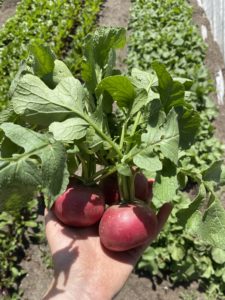 nd what drew you to it?
nd what drew you to it?
I’ve always been fascinated by the farming process. During high school, I worked at a produce stand and in the fields of a local farm in my hometown. After taking the course Food Security and Sustainability last semester, I learned about the need for more sustainable farming methods. As a result, I became interested in urban agriculture, which led me to find GCG. I was inspired by their commitment to growing fresh produce in underutilized city spaces and connecting the public to their food system through educational programs.
Q: Tell us about your experience working as their Horticulture Intern.
One of my favorite things about my co-op at GCG is the variety of things I get to do. Every day is different, and as the growing season progresses, my responsibilities and projects are always changing. At the beginning of my co-op, I was generally doing lots of organizing and cleaning projects to prepare for the official start of the season when all of the seasonal farmers (who maintain GCG’s various farming sites and run programs) would be starting. Now that the season is here, I’ve been going with farmers to their sites and helping as needed, including teaching at educational programs with our various school garden beds. My other tasks include seeding microgreens, maintaining our various hydroponic units, planting in our Research and Development garden at the office, and seeding in our greenhouse. One of my favorite parts of my co-op has been going to the sites because I’ve visited many new places in MA and spent time with our amazing farmers. A site that GCG is known for is Fenway Farms on the roof of Fenway Park, and it’s been a really cool experience to plant and harvest fresh produce at such a historic Boston location.
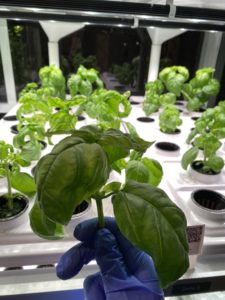 Q: How has this experience given you insight into what you want to do in the future?
Q: How has this experience given you insight into what you want to do in the future?
Since GCG is a smaller company, I’ve been very involved and immersed in everything and work closely with various departments. As a result, I’ve learned about the career path of people in multiple roles, and it opened my eyes to the diverse career possibilities available in the environmental sector. My experience at GCG has solidified my desire for a career where I can spend time outdoors, challenge myself, have day-to-day variety, interact closely with others and the public, and spread environmental awareness. Co-op is an excellent opportunity to see what you enjoy and what works for you.
Q: Were there any particular courses, programs, or Northeastern faculty you feel prepared you to take this position?
I’ve found myself using what I learned from many of my marine and environmental sciences (MES) courses daily, especially from the Food Security and Sustainability course I took with Dr. Tara Duffy. It was a fascinating class that helped spark my passion for sustainable agriculture and opened my eyes to issues within our food system. My experience as a lab teaching assistant for Introduction to Environmental, Social, and Biological Data taught by Dr. Katie Lotterhos also bolstered my confidence, improved my public speaking skills, and provided me with time management and communication skills.
Q: What advice would you give current MES students searching for co-ops?
It may seem like there aren’t many MES co-ops available, but patience is vital! They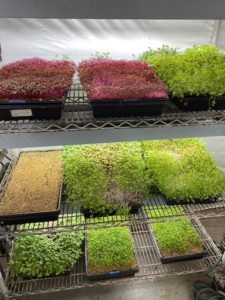 aren’t always posted as early as others, and you’ll likely have to do a lot of thorough searching to find the positions that genuinely interest you. Reaching out to those who worked or are currently working at the co-op you’re applying to can help you better understand the role and make connections. Don’t be afraid to ask your co-op advisor for assistance when you need it! I’m grateful for all the help my advisor Emily Condon gave me during my co-op search. Also, it can be easy to gauge how you’re doing by comparing your progress to your friends or peers searching for co-ops, but everyone’s experience is different. Finally, the co-op search process varies by major, so focus on what you’re doing and set your goals and deadlines according to your timeline.
aren’t always posted as early as others, and you’ll likely have to do a lot of thorough searching to find the positions that genuinely interest you. Reaching out to those who worked or are currently working at the co-op you’re applying to can help you better understand the role and make connections. Don’t be afraid to ask your co-op advisor for assistance when you need it! I’m grateful for all the help my advisor Emily Condon gave me during my co-op search. Also, it can be easy to gauge how you’re doing by comparing your progress to your friends or peers searching for co-ops, but everyone’s experience is different. Finally, the co-op search process varies by major, so focus on what you’re doing and set your goals and deadlines according to your timeline.
Q: You’re currently a mentee for MESPM. Tell us about this experience. How has this resource impacted you?
MESPM has been a valuable resource and experience, especially when I was a freshman. Mentees are paired up with an upperclassmen mentor who is also a member of the MES department that shares similar interests and relevant experiences.
I met with my mentor about once a month during my first year to discuss how I was doing and ask her questions about various experiences. It was nice to speak to someone with firsthand experience as an MES major at Northeastern and obtain valuable advice that helped guide me during my first year of college. It’s such a great program filled with kind and friendly people, and I would recommend all MES students check it out!
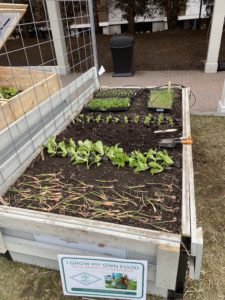 Q: As a Food Recovery Network (FRN) volunteer, why is reducing food waste so important? Tell us about this experience.
Q: As a Food Recovery Network (FRN) volunteer, why is reducing food waste so important? Tell us about this experience.
I started volunteering with the FRN last semester, and it’s been a great way to help give back to my local community. At the beginning of the semester, you sign up for a food run, and each week you go with your group to one of the local cafes and bring leftover food items to a nearby organization such as the YMCA. Reducing food waste is essential because even simple actions are a step in the right direction toward increasing food security in our community. It’s not a significant time commitment to do a food run, but it makes a difference over the semester!
Q: Is there anything else you would like to share?
Last semester, Green City Growers installed some garden beds behind Snell Library, and the Northeastern Student Garden runs them! Anyone is welcome to participate, regardless of previous gardening experience. If you’re interested in getting involved, check out @neustudentgarden on Instagram or email [email protected]!
